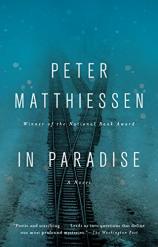In Paradise
Review
In Paradise
It’s fitting that this review of Peter Matthiessen’s IN PARADISE, the account of a Zen meditation retreat at the Auschwitz-Birkenau extermination camp, will be published during the week we observe Yom HaShoah, Holocaust Remembrance Day. Like the characters in Matthiessen’s final novel (he died on April 5th, days before the book was published), nearly seven decades after the world discovered the full scope of the Nazis’ atrocities, we still struggle to comprehend the enormity of this horror. While Matthiessen has made an admirable effort to add his voice to that conversation, as a work of literature, his flawed novel has a desiccated quality, as if, faced with confronting these monstrous events, he quailed at the prospect of encompassing this story in a brief narrative.
In December 1996, 140 participants from 12 countries gather at Auschwitz for the retreat, an experience in which Matthiessen himself participated three times. The novel’s protagonist, Clements Olin, is a scholar of Slavic literature completing a monograph on Polish writer Tadeusz Borowski, who survived Auschwitz only to commit suicide in 1951 at age 28. Olin, a native of Poland who emigrated to the United States as a child, is returning to his native Cracow region with decidedly mixed emotions.
"There are moments when Matthiessen evokes with undeniable power this nightmare setting... [I]t’s hard to overcome the feeling that a writer possessed of Matthiessen’s surpassing gift for nonfiction could have captured the true texture of his experience without resorting to invention."
His skepticism arises, in part, from the very characterization of the event as a “spiritual retreat.” He wonders “what ‘spiritual’ business can these people have here? What transcendence do they aspire to, hope to attain?” For him, the term “bearing witness” seems “anachronistic and over-earnest.” Olin observes that “even horror becomes wearisome,” and he doubts that mere meditation is equal to the task of confronting it. When, late in the novel, the participants, who, to him, seem to “be here on painful missions incompletely understood,” break into spontaneous dancing at one of their evening gatherings, for all its apparent inappropriateness it’s almost as if they are expressing themselves with the only emotion available to them, repressed since their arrival.
Much of the problem with the book lies in the lack of depth with which Matthiessen portrays these characters, a considerable failing even in a novel of ideas such as this one. Whether it’s the Germans struggling with their collective guilt or a young Palestinian who speaks at a group session, only to be quickly denounced as a “raghead” by an “American-born Israeli,” they seem to exist principally as mouthpieces rather than full-blooded creations. One exception is an annoying character named Earwig, who persistently offers scabrous comments at high volume at some of the most emotionally fraught moments of the retreat, almost intolerable until his own mournful story eventually is revealed.
Matthiessen also fails to invest a pair of subplots with real emotion: one involves Olin’s attraction to a young Polish novice, Sister Catherine; the other traces his search for his ancestral home. These stories could have provided depth and texture to the story, but both trail off inconclusively. The novel alludes in passing to the question of the Catholic Church’s complicity in the Holocaust and to the Nazis’ persecution of homosexuals (when the participants don pink flannel triangles at one of their meditation sessions), but neither subject is pursued with much intensity.
There are moments when Matthiessen evokes with undeniable power this nightmare setting, as when Olin stands on the platform “between tracks where discerning SS doctors selected those few prisoners with enough strength to be worked to death” and feels that its “emptiness is filled by a multitude of faceless shapes milling close around him. He feels the vibration of their footfalls.” Later, accompanied by a subdued Earwig, Olin walks across a meadow, the site of a mass grave, and senses that “under these heavy grasses glazed with ice the ground is soft, unstable, that it quakes in a sickening way beneath his boots like a great grassy jelly.”
In speaking of his choice to write a fictional version of his Auschwitz experience, Matthiessen commented that “only fiction would allow me to probe from a variety of viewpoints the great strangeness of what I had felt.” It’s inevitable to feel sadness that he’s no longer here to elaborate upon his reasons for that choice, perhaps because it’s hard to overcome the feeling that a writer possessed of Matthiessen’s surpassing gift for nonfiction could have captured the true texture of his experience without resorting to invention. Maybe that’s why this novel, for all its nobility and earnestness, ultimately disappoints.
Reviewed by Harvey Freedenberg on May 2, 2014
In Paradise
- Publication Date: February 3, 2015
- Genres: Fiction
- Paperback: 272 pages
- Publisher: Riverhead Trade
- ISBN-10: 1594633525
- ISBN-13: 9781594633522





